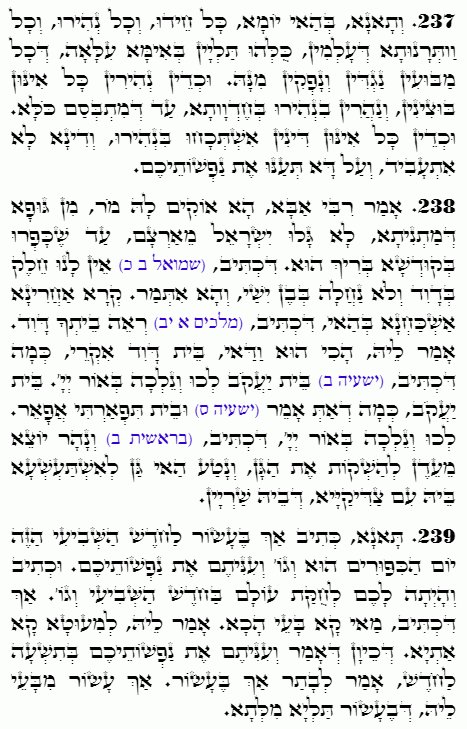Daily Zohar # 4655 – Acharei Mot – The House of David
Daily Zohar 4655

Hebrew translation:
238. אָמַר רַבִּי אַבָּא, הֲרֵי מוֹרֵנוּ בֵּאֵר אוֹתָהּ מִגּוּף הַמִּשְׁנָה – לֹא גָלוּ יִשְׂרָאֵל מֵאַרְצָם עַד שֶׁכָּפְרוּ בַּקָּדוֹשׁ בָּרוּךְ הוּא, שֶׁכָּתוּב (שמואל-ב כ) אֵין לָנוּ חֵלֶק בְּדָוִד וְלֹא נַחֲלָה (לָּנוּ) בְּבֶן יִשַׁי, וַהֲרֵי נֶאֱמַר. פָּסוּק אַחֵר מָצָאנוּ עַל זֶה, שֶׁכָּתוּב (מלכים-א יא) רְאֵה בֵיתְךָ דָּוִד. אָמַר לוֹ, כָּךְ זֶה וַדַּאי, בֵּית דָּוִד נִקְרָא, כְּמוֹ שֶׁכָּתוּב (ישעיה ה) בֵּית יַעֲקֹב לְכוּ וְנֵלְכָה בְּאוֹר ה’. בֵּית יַעֲקֹב, כְּמוֹ שֶׁנֶּאֱמַר (שם ס) וּבֵית תִּפְאַרְתִּי אֲפָאֵר. לְכוּ וְנֵלְכָה בְּאוֹר ה’, שֶׁכָּתוּב וְנָהָר יֹצֵא מֵעֵדֶן לְהַשְׁקוֹת אֶת הַגָּן, וְנָטַע אֶת הַגָּן הַזֶּה לְהִשְׁתַּעֲשֵׁעַ בּוֹ עִם הַצַּדִּיקִים, שֶׁבּוֹ הֵם שְׁרוּיִים.
239. לָמַדְנוּ, כָּתוּב אַךְ בֶּעָשׂוֹר לַחֹדֶשׁ הַשְּׁבִיעִי הַזֶּה יוֹם הַכִּפֻּרִים הוּא וְגוֹ’ וְעִנִּיתֶם אֶת נַפְשֹׁתֵיכֶם. וְכָתוּב וְהָיְתָה לָכֶם לְחֻקַּת עוֹלָם בַּחֹדֶשׁ הַשְּׁבִיעִי וְגוֹ’. מַה שֶּׁכָּתוּב אַךְ, מַה הוּא רוֹצֶה כָּאן? אָמַר לוֹ, זֶה בָּא לְמַעֵט, שֶׁכֵּיוָן שֶׁאָמַר וְעִנִּיתֶם אֶת נַפְשֹׁתֵיכֶם בְּתִשְׁעָה לַחֹדֶשׁ, אָמַר (אַחַר כָּךְ) אַךְ בֶּעָשׂוֹר, וְהָיָה צָרִיךְ לִהְיוֹת אַךְ עָשׂוֹר! שֶׁבֶּעָשׂוֹר הַדָּבָר תָּלוּי.
.
Zohar Acharei Mot
Continued from previous DZ
#237
We have learned that on that day (Yom Kippur), all joy, all Light, and all acts of forgiveness in the worlds—namely the atonement of sins—are dependent on the Supernal Mother, Binah, from whom all the fountains of light flow and emerge. These fountains include both the Light of Chokmah and the Light of Chassadim. At that time, all the candles (lights) are illuminated, referring to the מאורי האש (fiery luminaries) in Malchut, which illuminate with Light and joy until everything is sweetened and calmed. Even the judgments are illuminated because the judgments that come from the five afflictions (restrictions: eating, drinking, washing, using oils (perfumes), sex) cause the illumination of the Light of Chokmah. Without them, Chokmah would not be revealed, as explained earlier. The judgment is not fully executed and only serves as a potential threat. Thus, the command to “afflict your souls” enables the revelation of the Light of Chokmah.
Notes:
Binah’s role in Yom Kippur is significant in facilitating atonement and spiritual illumination. The “five afflictions” create the necessary conditions for the Light to flow into the world.
The judgments felt through the afflictions of the day serve not to punish but to activate the flow of these higher Lights. By afflicting the soul, one opens the channels for the Light to shine, sweetening and transforming the severity of judgment into a source of joy and illumination. Thus, Yom Kippur becomes a day of profound spiritual transformation.
#238
Rabbi Abba said: “My master has already told us from the text of the Mishnah that the Israelites were not exiled from their land until they denied the Holy One, as it is written,
1 Kings 12:16
“וַיַּרְא כָּל יִשְׂרָאֵל כִּי לֹא שָׁמַע הַמֶּלֶךְ אֲלֵיהֶם וַיָּשִׁבוּ הָעָם אֶת הַמֶּלֶךְ דָּבָר לֵאמֹר מַה לָּנוּ חֵלֶק בְּדָוִד וְלֹא נַחֲלָה בְּבֶן יִשַׁי לְאֹהָלֶיךָ יִשְׂרָאֵל עַתָּה רְאֵה בֵיתְךָ דָּוִד וַיֵּלֶךְ יִשְׂרָאֵל לְאֹהָלָיו.”
“Now when all Israel saw that the king did not listen to them, the people answered the king, saying: “What share have we in David? We have no inheritance in the son of Jesse. To your tents, O Israel! Now, see to your own house, O David!” So Israel departed to their tents.”
David represents Malchut, and they said, We have no part in Malchut.’ The verse also states, ‘See to your own house, David.’ And the question arises: Does the ‘House of David’ also refer to the Malchut?
He answered: “Indeed, Malchut is called the ‘House of David,’ as it is written, ‘House of Jacob, “בֵּית יַעֲקֹב לְכוּ וְנֵלְכָה בְּאוֹר יְהוָה.” “let us walk in the light of YHVH “(Isaiah 2:5). The ‘House of Jacob’ is like what is written, “וּבֵית תִּפְאַרְתִּי אֲפָאֵר” “And I will glorify the house of My glory” (Isaiah 60:7), for Jacob represents Tiferet (Glory), and the ‘House of Glory’ is the Malchut. Similarly, the ‘House of David’ refers to Malchut. The explanation of the verse ‘House of Jacob, let us walk in the light of YHVH’ is as follows: it is written, “וְנָהָר יֹצֵא מֵעֵדֶן לְהַשְׁקוֹת אֶת הַגָּן” “A river went out of Eden to water the garden” (Genesis 2:10), where the river represents Zeir Anpin, which waters the garden, which is Malchut. Z “A planted the garden to delight in it with the Tzadikim who dwell there. And this is what is meant by ‘House of Jacob,’ which is the Malchut, ‘Let us walk in the light of YHVH,’ which is Zeir Anpin, who waters Malchut.
Notes:
This Zohar explains the connection between the Israelites’ exile and their rejection of Hashem’s authority, specifically the Malchut. The “House of David” symbolizes the Malchut, and when the people said, “We have no part in David,” they essentially rejected their connection to Malchut, the Kingdom of Hashem.
#239
We have learned from the verse, “אַךְ בֶּעָשׂוֹר לַחֹדֶשׁ הַשְּׁבִיעִי הַזֶּה יוֹם הַכִּפֻּרִים הוּא ” “However, on the tenth day of this seventh month… you shall afflict your souls” (Leviticus 16:29). And it is written, “וְהָיְתָה לָכֶם לְחֻקַּת עוֹלָם בַּחֹדֶשׁ הַשְּׁבִיעִי” “It shall be a statute forever in the seventh month, on the tenth day of the month, you shall afflict your souls” (Leviticus 23:27), but it does not say there, “However (אַךְ), on the tenth.” Why does it say here, “However, on the tenth”? What is the intention of the word “However (אַךְ)”?
Rabbi Abba answers: The word “however” (in Hebrew, “אַךְ”) comes to a limit. In every place where “however” is written, it serves to limit something. Because it says, “You shall afflict your souls on the ninth day of the month.” Afterward, it says, “However, on the tenth,” it would have been appropriate to say “only the tenth” instead of “however,” but the use of “however” teaches us that the matter of afflicting your souls is primarily on the tenth, and the ninth is to be excluded.
{||}

 Previous: Acharei Mot
Previous: Acharei Mot

